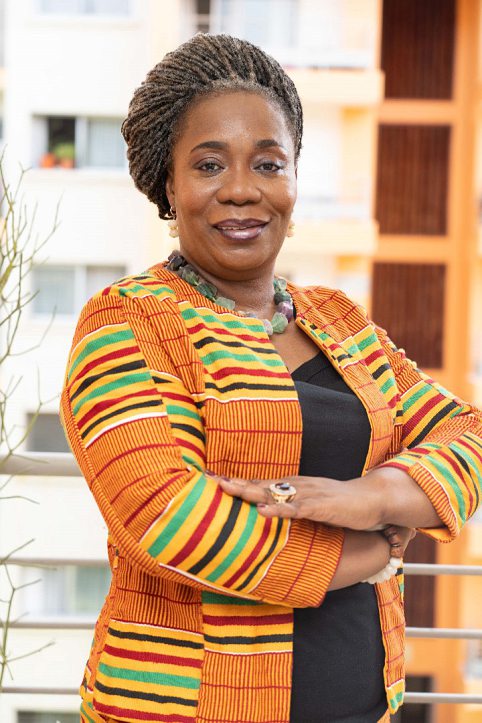Georgette Zamblé
«For a national equal opportunities policy»
Head of Exploration at the united Nations development Programme (UNDP)
Georgette Zamblé, a trained psychologist with a civil society background, is a specialist in gender issues. For several years now, she has been campaigning for greater leadership and empowerment for women, especially in rural areas.
AM: You are striving for greater representation of women in the public arena, both in Côte d'Ivoire and elsewhere in Africa. Why is fighting this battle so important?

Georgette Zamblé: Women's representation in the public arena is first and foremost a human right. It is essential that society as a whole accepts them without discrimination. This is about recognising their value. It also involves women's active participation in public life and socio-economic development. This presupposes the deconstruction of stereotypes and other gender clichés, as well as the norms and limits imposed on them.
Gender equality is increasingly on the agenda around the world. What is the situation in Côte d'Ivoire?
The country has undertaken to draw up a national policy on equal opportunities, equity and gender, applicable to development programmes and projects in all sectors of public life. In 2007, the Côte d'Ivoire government made a solemn declaration to this effect. Texts and other measures were subsequently passed. A national policy document on equal opportunities was drafted, reiterating the need to take the gender dimension into account at all levels of the country's development process. However, socio-cultural constraints are still present, dominated by patriarchal thinking. There is also a lack of capacity to integrate the gender issue into development planning. Over and above explanations at national level, this requires the deployment of simple tools to facilitate the integration of women. So that they can have control over resources, play a greater part in decision-making bodies and public life, and so on.
In 2019, the Ivorian government introduced new laws to better protect women. This applies in particular to marriage and women's representation in the public arena. Do you think this is enough? If not, what remains to be done?
Several laws already exist. They have been strengthened to protect women and ensure their equality with men. These include Law 2019-870, which imposes a 30% quota of women on candidate lists for legislative and local elections. There is also the law of 26 June 2019, which gives married women the option of not taking their husband's name, and which forbids marriage to minors. Law 2019-574 criminalises rape, with penalties ranging from five to 20 years' imprisonment, and even life imprisonment in some cases. And last but not least, the law protecting the rights of pregnant women in the workplace. I would like to take this opportunity to pay tribute to all those who contributed to the drafting of these laws. The question remains as to how these laws are actually applied on a day-to-day basis. Because, despite their existence, girls and women continue to be victims of various forms of discrimination. Violence is still trivialised, simply because it is perpetrated against women. We must recognise that laws are made by humans, for humans, in dynamic contexts. They are therefore neither infallible nor fixed, just like traditions, and must constantly be revisited to adapt to the current realities. Insofar as the explicit idea is to eradicate evils, certain laws must, for example, be followed by more dissuasive and repressive enforcement measures. Finally, we need to continue to publicise existing laws through appropriate channels, to raise awareness of women's rights among all segments of the public, including people living in rural areas.
In your opinion, which battles in this area have had a positive outcome so far?
Côte d'Ivoire's fundamental law was revised in 2016, with the aim of incorporating parity. Even if some of the resulting provisions still need to be improved, the fact remains that this is an example to be followed. And it's all the result of several years of civil society advocacy, as well as consultation between public authorities and the private sector.
You launched the LeadAfricaines network. To what end?
I founded LeadAfricaines in 2011 and ran it for eight years, before handing over to Karidja Tanou, a fellow expert, with the aim of clearly demonstrating our commitment to leadership. It's the vision of a fair and equitable Africa, where women, whether in rural or urban settings, dare to run their own businesses with dignity and ambition, and take part in governance. The network's mission is to provide the most disadvantaged women and girls with opportunities that will empower them to take their place in decision-making spheres, to fulfil their potential and to remain there, with a view to achieving gender equality.
|
Profile Georgette Zamblé has a PhD in Gender and Sustainable Empowerment in Rural Areas. She also holds a Master's degree in Psychology, Communication and Leadership, along with other qualifications. Driven by her commitment, she co-founded the community of Gender Practitioners in Côte d'Ivoire. She is also an expert in the World Bank's OKS (Organizational Knowledge Sharing) programme. Since 2019, she has been working for the United Nations Development Programme (UNDP). Georgette Zamblé is also an Officer in the Ivorian Order of Merit, founder of the LeadAfricaines platform and a writer. In March, her book La Femme de Mes Rêves (The Woman of My Dreams) was published by Mouna in Abidjan. |